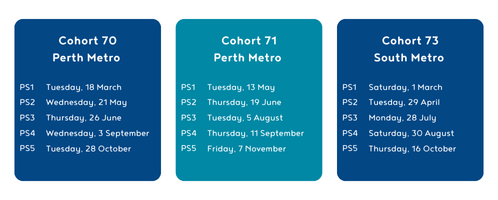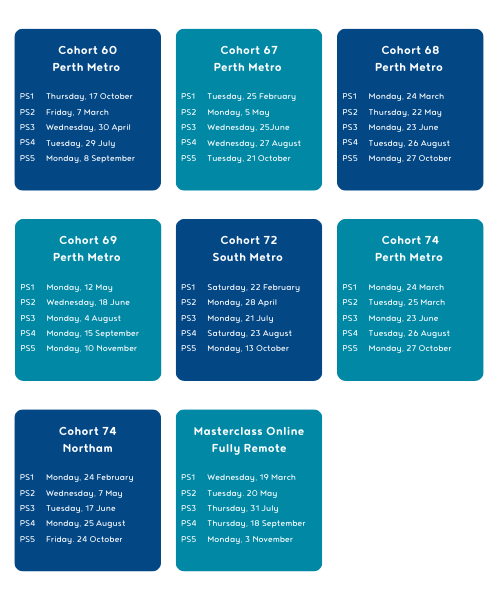The Masterclass Series teachers across the country have achieved exceptional improvements in student outcomes by refining their teaching practice. Hear more from teachers across early childhood, primary and secondary classrooms and across subjects and learning areas.
Year 2, Literacy
A Year 2 teacher compared student results on two DIBELS Reading Fluency (Words Correct) assessments from Term 1 and Term 4, after starting the Masterclass in Term 2. The teacher set a goal of students achieving between 90 – 100 words correct. Implementation of instructional changes saw student achievement above 100-words-correct increase by 57%. Both low-achieving and high-achieving students benefited, with the average words correct increasing from 67 to 112.


Year 4, Reading
A Year 4 class completed Acadience ORF assessments, examining Words Correct and Accuracy. The implementation of extended text tactics, vocabulary instruction and sentence-level writing techniques saw the proportion of students at or above the benchmark increase by 16% for Words Correct, and 14% for Accuracy.

Year 7/8, Music
A teacher compared the results of their Year 7/8 mixed-age Music class on the Music Reading Beep Test. The students sat two tests a minimum of 6 months apart. This test provides an independent measure of notational literacy with guidance on typical improvement. Following the implementation of strategies shared in the Masterclass Series, both Year 7 and Year 8 student groups outperformed the typical improvement guide by at least a factor of 2.

Year 8, Science
The teacher conducted PAT Science assessments 6 months apart in both 2023 and 2024. The improvement scores for each year were filtered into the percentiles and compared across 2023 and 2024. Prior to the teacher participating in the Masterclass Series, 0% of the students had improvement scores above the 70th percentile. By the end of 2024, after the teacher started implementing high-impact instructional strategies in their classroom, this number increased to 31%.


Click on the button below to view and download Teach Well’s full 2024 Impact Report.



 The Karnup Network of 12 primary schools and 3 secondary schools serves more than 10,000 students, approximately one hour south of Perth. In a rapidly developing and growing area, most schools are less than 10 years old and have seen large year-on-year growth in student numbers. After 3 years of sustained effort and commitment, spanning 6 dedicated cohorts of the Masterclass Series for both K-2 and Year 3-10 teachers and leaders, the schools are seeing visible improvements in student learning, as reflected in NAPLAN. The network has also built their leadership capability through Teach Well’s Instructional Lead Fellowship program and Instructional Coaching Impact Cycle partner program. Through a combined focus on empowering teachers and leaders at all levels, Karnup has achieved some of the most impressive progress for any network in WA.
The Karnup Network of 12 primary schools and 3 secondary schools serves more than 10,000 students, approximately one hour south of Perth. In a rapidly developing and growing area, most schools are less than 10 years old and have seen large year-on-year growth in student numbers. After 3 years of sustained effort and commitment, spanning 6 dedicated cohorts of the Masterclass Series for both K-2 and Year 3-10 teachers and leaders, the schools are seeing visible improvements in student learning, as reflected in NAPLAN. The network has also built their leadership capability through Teach Well’s Instructional Lead Fellowship program and Instructional Coaching Impact Cycle partner program. Through a combined focus on empowering teachers and leaders at all levels, Karnup has achieved some of the most impressive progress for any network in WA. In 2021, at the start of the network’s improvement agenda, 26% of NAPLAN areas for primary schools were well below expected performance. In 2024, only 7% are well below, with 93% of NAPLAN areas now within expected performance – a four-fold increase in the percentage of NAPLAN areas well above expected performance between 2021 and 2024 (Figure 1). For all network schools, 94% of NAPLAN areas are now within expected performance, or well above expected performance, an increase of 27 percentage points from 2023 (Figure 2). Year 3 and Year 5 students have shown impressive improvement across all NAPLAN areas between 2021 and 2024 (Figures 3-4).
In 2021, at the start of the network’s improvement agenda, 26% of NAPLAN areas for primary schools were well below expected performance. In 2024, only 7% are well below, with 93% of NAPLAN areas now within expected performance – a four-fold increase in the percentage of NAPLAN areas well above expected performance between 2021 and 2024 (Figure 1). For all network schools, 94% of NAPLAN areas are now within expected performance, or well above expected performance, an increase of 27 percentage points from 2023 (Figure 2). Year 3 and Year 5 students have shown impressive improvement across all NAPLAN areas between 2021 and 2024 (Figures 3-4).




 Since 2021, Teach Well has partnered with WA’s Midwest Region as part of their Targeted Teaching strategy to improve student academic outcomes. The Midwest education region has 46 public schools, serving over 7,700 students. With some of the state’s most disadvantaged children and around 30% Indigenous students, the region had historically seen stagnated student results. Through the Targeted Teaching strategy, enabled through a relentless focus on high-impact instruction using Teach Well’s Masterclass Series and the Instructional Lead Fellowship, schools have achieved outstanding year-on-year growth in student results. The Teach Well experience has been highly effective in uniting networks of schools across the Midwest by providing a common language for high-impact instruction. School leaders across the region have worked to build educators’ skills to drive sustainable change at all levels in the Midwest through a focus on:
Since 2021, Teach Well has partnered with WA’s Midwest Region as part of their Targeted Teaching strategy to improve student academic outcomes. The Midwest education region has 46 public schools, serving over 7,700 students. With some of the state’s most disadvantaged children and around 30% Indigenous students, the region had historically seen stagnated student results. Through the Targeted Teaching strategy, enabled through a relentless focus on high-impact instruction using Teach Well’s Masterclass Series and the Instructional Lead Fellowship, schools have achieved outstanding year-on-year growth in student results. The Teach Well experience has been highly effective in uniting networks of schools across the Midwest by providing a common language for high-impact instruction. School leaders across the region have worked to build educators’ skills to drive sustainable change at all levels in the Midwest through a focus on:
 Alumni of Teach Well’s programs often attend refresher workshops with their teams to deepen their knowledge. This empowers them to lead more work back at school. This kind of peer support helps to reinforce best practices across schools. A focus on supporting coaches through professional learning and mentoring has enabled schools to develop strong coaching conversations. The results of this partnership are inspiring. The Midwest schools have shown strong improvement from 2021 to 2024, with 89% of all NAPLAN areas now within expected performance, or well above expected performance (Figure 1).
Alumni of Teach Well’s programs often attend refresher workshops with their teams to deepen their knowledge. This empowers them to lead more work back at school. This kind of peer support helps to reinforce best practices across schools. A focus on supporting coaches through professional learning and mentoring has enabled schools to develop strong coaching conversations. The results of this partnership are inspiring. The Midwest schools have shown strong improvement from 2021 to 2024, with 89% of all NAPLAN areas now within expected performance, or well above expected performance (Figure 1).


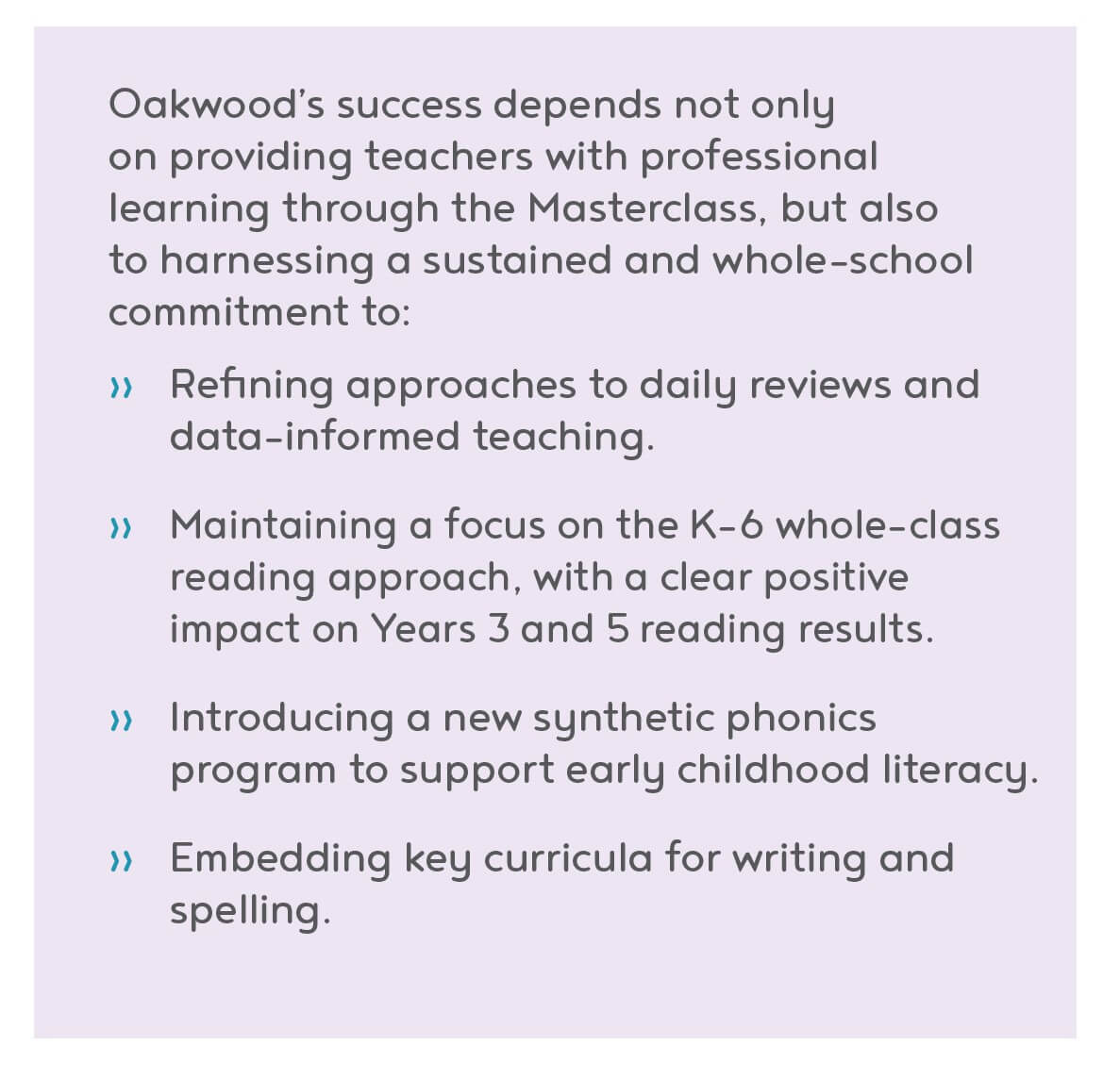 Oakwood Primary School is a government school located one hour south of Perth. With an ICSEA value of 1005, the school serves over 900 students. As part of its school improvement journey, the school committed to the Masterclass Series in 2022 to upskill its teachers in high-impact instruction. Since then, 29 staff have participated in the Masterclass Series. In 2021, at the start of Oakwood’s improvement journey, for Years 3 and 5, the percentage of NAPLAN areas within expected performance was 60%, with 40% of areas well below expected performance. In 2024, 100% of NAPLAN areas are now within or well above expected performance. Oakwood’s target of being at or exceeding the performance of ‘Like Schools’ (i.e. with students from similar backgrounds based on parental occupation and education) was resoundingly achieved in 2024. Students significantly outperformed their peers from Like Schools in the key areas of Reading, Writing, and Numeracy across both Years 3 and 5 (Figures 1-3), bucking the trend of stagnating performance in peer schools.
Oakwood Primary School is a government school located one hour south of Perth. With an ICSEA value of 1005, the school serves over 900 students. As part of its school improvement journey, the school committed to the Masterclass Series in 2022 to upskill its teachers in high-impact instruction. Since then, 29 staff have participated in the Masterclass Series. In 2021, at the start of Oakwood’s improvement journey, for Years 3 and 5, the percentage of NAPLAN areas within expected performance was 60%, with 40% of areas well below expected performance. In 2024, 100% of NAPLAN areas are now within or well above expected performance. Oakwood’s target of being at or exceeding the performance of ‘Like Schools’ (i.e. with students from similar backgrounds based on parental occupation and education) was resoundingly achieved in 2024. Students significantly outperformed their peers from Like Schools in the key areas of Reading, Writing, and Numeracy across both Years 3 and 5 (Figures 1-3), bucking the trend of stagnating performance in peer schools.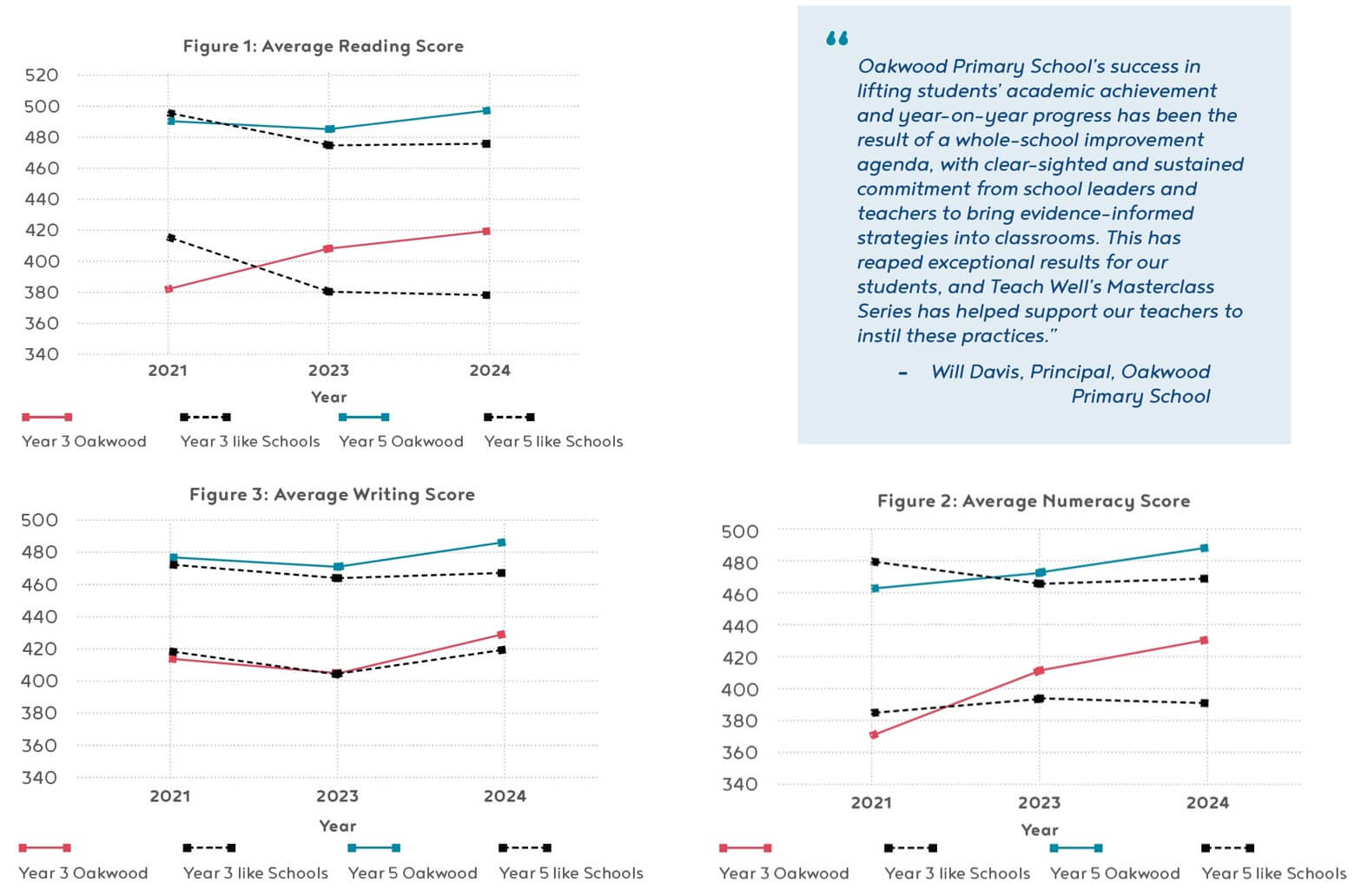
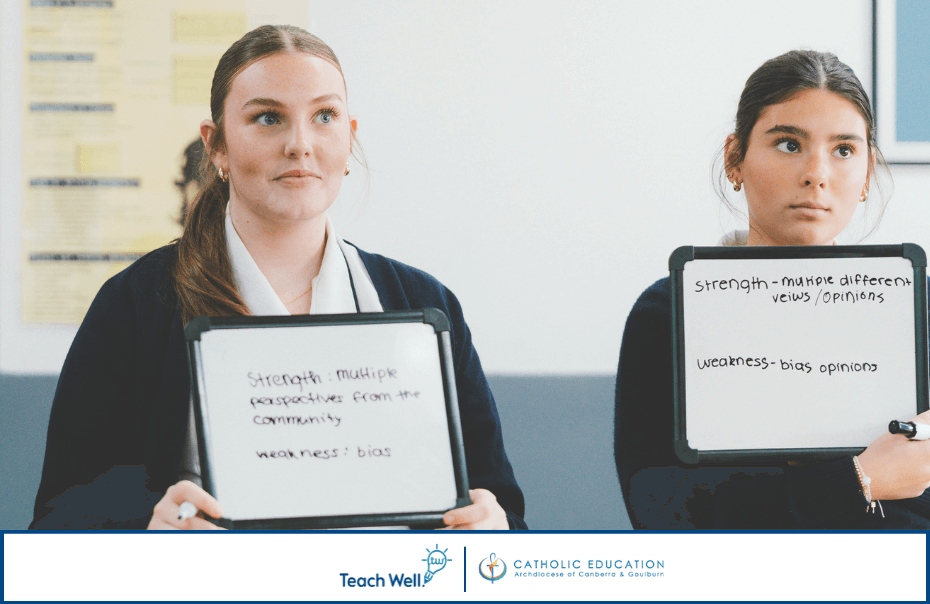
 Five years ago, the Director of Catholic Education for the Archdiocese of Canberra and Goulburn, Ross Fox, decided to retrain his teaching workforce of 1500 staff in the Science of Learning. This educational reform emphasised the importance of all teachers being able to confidently deliver evidence-based high-impact teaching practices, with a shared focus on how students learn and understand new ideas. As part of the Catalyst project, Teach Well’s flagship Masterclass Series has been delivered under the name High Impact Teaching Practices (HITP) in Action – Secondary & Central Series.
Five years ago, the Director of Catholic Education for the Archdiocese of Canberra and Goulburn, Ross Fox, decided to retrain his teaching workforce of 1500 staff in the Science of Learning. This educational reform emphasised the importance of all teachers being able to confidently deliver evidence-based high-impact teaching practices, with a shared focus on how students learn and understand new ideas. As part of the Catalyst project, Teach Well’s flagship Masterclass Series has been delivered under the name High Impact Teaching Practices (HITP) in Action – Secondary & Central Series.



